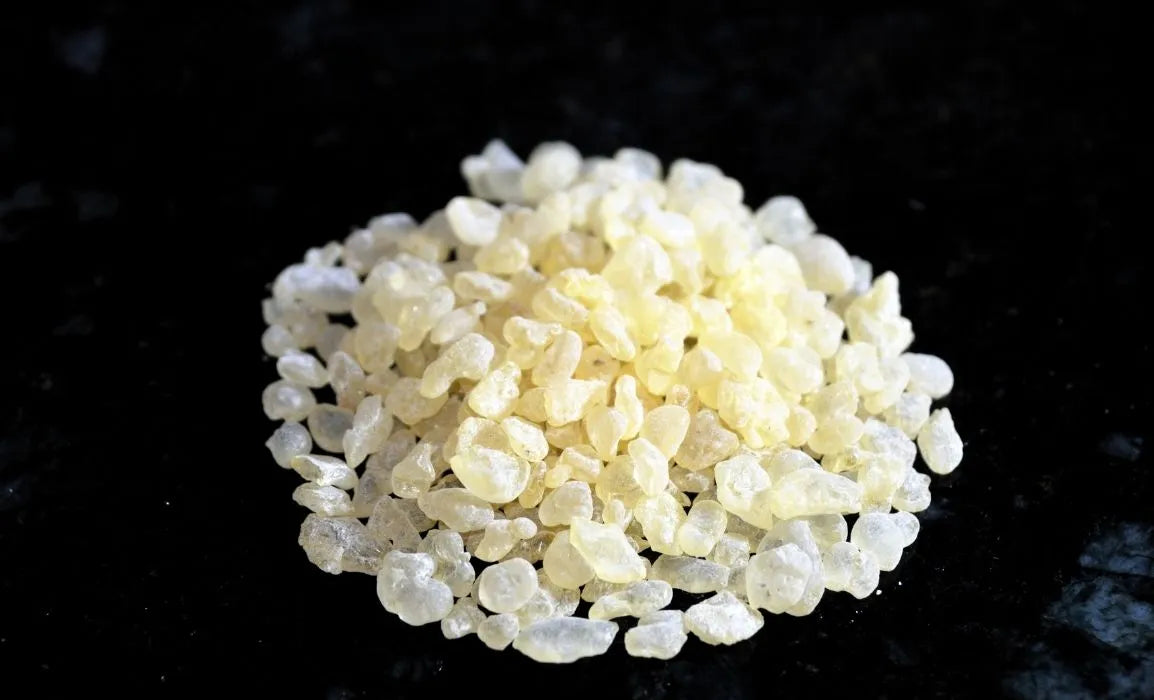Xanthan Gum in skincare

Introduction
Xanthan gum is a polysaccharide produced from simple sugars by a specific type of bacteria enzyme as the main organism. Precisely this uniqueness - to stabilise and thicken liquid - makes it helpful for formulating moisturisers or other skincare products. Excipients like xanthan gum can be used for multiple applications and prove to have a positive effect on skin conditions.
What is xanthan gum?
Xanthan gum is a polyelectrolyte and polysaccharide of high molecular weight that has a wide range of applications as a thickening and stabilising agent. Its production method makes it completely natural, non-toxic and non-irritating. It is commonly added along with other thickening agents and stabilisers for better texture, fluidity, and surface quality. This ingredient enhances the emulsion's structural stability over a range of temperature and pH conditions.
How is xanthan gum produced?
Xanthan gum is produced by the fermentation method using the bacterium Xanthomonas campestris. The described procedure starts with the growth of the bacteria in a rich medium culture, where they feast on sugar and excrete xanthan gum. The process of fermentation is completed when the xanthan gum is precipitated with the aid of alcohol after the bacteria have been removed. Then it is washed, dried and crumbled into powder. Appropriate quality control measures are undertaken to make sure that what has been produced is of the expected quality and is useful for many ends.
What does xanthan gum do in skincare products?
This ingredient is often used in creams, lotions, serums, gels and other products to improve the texture and properties of formulations. Xanthan gum adds viscosity so that any accelerants make it possible to obtain a smooth, creamy end product without the problem of the effectively incompatible components settling or separating with time. Other benefits include the ease of spreading the product on the skin, allowing deeper penetration of the product.
Benefits of xanthan gum in skincare
Xanthan gum is beneficial in many aspects when it comes to its use in the skincare formulation. Below are the examples of xanthan gum benefits:
- Thickening and stabilising: Xanthan gum is one of the most common thickeners in skincare and is used to help stabilise emulsions. Same way, it helps in benefiting the desirable consistency of products to avoid lumps or phases.
- Improved product performance: In some cases, xanthan gum can help in improving the effectiveness of other ingredients associated with skincare. This further helps the actives as well as other ingredients of the formulations to penetrate the skin quite well.
- Safe to use: Xanthan gum is natural and non-toxic, so there are no reported side effects from using it in skincare products.
- Ideal for all skin types: It works well with various types of skin. Since it is non-irritating and non-sensitising, it is also suitable for sensitive skin types, hence labelled as sensitive skin cosmeceutical.
Precautions while using xanthan gum
If you are using xanthan gum as an additive in your skincare formulations, some aspects of safety and allergies have to be noted:
- Eye irritation: Any chemical in the eyes is considered very irritating, and xanthan gum is no exception. Use plenty of water to flush your eyes if a xanthan gum-containing product enters your eyes.
- Skin irritation: While xanthan gum is considered a non-irritant, some people may be sensitive to xanthan gum and suffer from skin reactions. In such an event, it is advisable to discontinue the usage and seek a medical opinion from a skin specialist.
- Allergies: Xanthan gum, a biopolymer from the bacterium Xanthomonas campestris, can cause allergies in certain individuals. Those allergic to xanthan or similar bacteria should not consume products containing it.
- Ingestion: External use of xanthan gum can be described as safe in most cases; however, internal consumption of xanthan gum is not advised. Even in small quantities, ingestion will produce excessive fullness and even gas or diarrhoea for minimal time.
- Interactions with medications: Some medications may interfere with or be affected by the practice of using xanthan gum. This might include blood thinners or medications for lowering cholesterol. In case you take any medication, consult your dermatologist before applying any xanthan gum-containing skincare product.
Conclusion
In the skincare industry, xanthan gum is extremely useful and has unique qualities, which makes it a highly sought-after ingredient. It might be safe to say that the market for xanthan gum is likely to grow as it is primarily included in skincare products as more and more consumers seek to purchase natural and environmentally friendly products.

